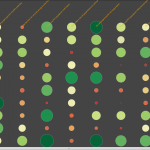Leo A. Meyerovichs and Ariel S. Rabkins investigation on “Social Influences on Language Adoption” enlighted me today. From the abstract:
“Why do some programming languages succeed and others fail? … we gathered and quantitatively analyzed several large datasets, including over 200,000 SourceForge projects and multiple surveys of 1,000-13,000 programmers. We find that social factors usually outweigh intrinsic technical ones. In fact, the larger the organization, the more important social factors become. … our results help explain the process by which languages become adopted or not.”
After I found this Google Tech Talk I couldn’t resist to play around with the data they publish on their website. Filtering for some of the most relevant (IMPO) languages produced the following picture (click to enlarge):

It marks C# to be the language, people rely on most for GUI projects. Did we expect something else? ![]() What really did surprise me is the fact, people already put about the same preference on C++, C# and Scala regarding the suitability for scientific computing. I wonder, if this picture would change, if we would also take ILNumerics into account!?
What really did surprise me is the fact, people already put about the same preference on C++, C# and Scala regarding the suitability for scientific computing. I wonder, if this picture would change, if we would also take ILNumerics into account!?
Go ahaed and visit the interactive visualizations yourself!
Btw, the most important slices for me in the tech talk are found around minute 28:35. Here, Leo talks about catalyst factors in the adaptation process and identifies “Simplicity, relative advantage, trialability, observability and compatibility” – nothing really new to you, I suppose. But I certainly feel comfortable, to have them all together as a nice “to keep in mind” list…
